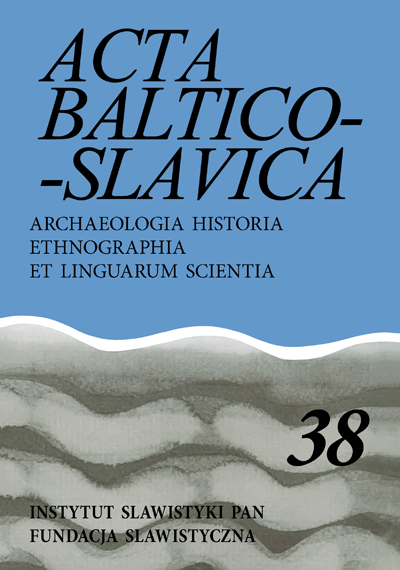Prasa radziecka wydawana w latach 30. XX w. w Republice Niemców Powołża. Wprowadzenie do zagadnienia i uwagi o języku
The soviet press in the Volga German Autonomous Soviet Socialist Republic in the 1930s. Introduction to the topic and remarks regarding language
Author(s): Jolanta MędelskaSubject(s): History, Social Sciences, Language and Literature Studies, Cultural history, Media studies, Interwar Period (1920 - 1939)
Published by: Instytut Slawistyki Polskiej Akademii Nauk
Keywords: German press in the USSR; activities; linguistic style
Summary/Abstract: The author presents in brief the most significant facts from the history of Germans in Russia (from the Manifesto of Catherine II through the formation of the Volga German Autonomous Soviet Socialist Republic), outlining on this background the activities of the German language press in the Russia and in the early Soviet Union, with a primary focus on the so-called new ethnicities policy and its consequences for the German minority. In the 1920s and 1930s in the VG ASSR, publication of books, textbooks, brochures, documents and reports in German began on a massive scale, especially press and propaganda materials. The new ethnicities policy of the Soviet authorities naturally boiled down to the rapid and proper indoctrination of ethnic minorities, “educating” them in the spirit of communist ideology. For the Bolshevik party newspapers were instruments of comprehensive propaganda and agitation. Until the mid-1920s, over 70 periodicals were published in German in the entire USSR. In the Volga German Republic, 21 newspapers were published in German, including the specialized Wolgadeutsches Schulblatt, Sei Bereit, Rote Jugend, but mainly press for the canton, the kolkhoz or sovkhoz level, and even papers for machinists (Tempo. Bolschewistisches Alltägl. Bulletin, Lenins Weg). Frequently the periodicals were published in Russian alongside a German-language version, e.g. Трудовая правда and Arbeiterwahrheit, as well as publications in Russian only, including Вперед к победе. The journalists’ qualifications were very low. Periodicals frequently contained reports by “rabkors” (worker correspondents) and “selkors” (village correspondents), people for whom only very recently had been quite far removed from pouring out their thoughts on paper. The pages of the papers reflected the degradation of the German language used in the USSR, its mixing with Russianisms, especially Sovietisms, including peculiar acronyms (e.g. Ambar, Arbuse, Batrake, Otlitschnik, Partorg, Smytschka, Rote Tafel, Schwarze Tafel, KK der AP(B)SU, KVA der ASSR der WD, MTS).
Journal: Acta Baltico Slavica
- Issue Year: 2014
- Issue No: 38
- Page Range: 219-243
- Page Count: 25
- Language: Polish

